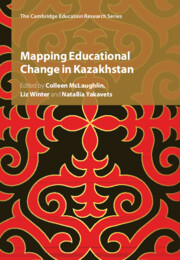Book contents
- Mapping Educational Change in Kazakhstan
- Mapping Educational Change in Kazakhstan
- Copyright page
- Dedication
- Contents
- Figures
- Tables
- Contributors
- Preface
- Acknowledgements
- Introduction
- Part I Foundations of Scaling Up
- 1 Rationale for and Perceptions of the Educational Reform in Kazakhstan
- 2 The New Educational Structures and Networks as Drivers of National Modernisation
- 3 The Translation of ‘World-Class’ Academic Research Practices in Kazakhstan
- 4 Teaching Science in English in Secondary Schools in Kazakhstan
- 5 Diversity, Equity and Inclusion in Kazakhstani Schools
- Part II Piloting Initiatives and Scaling Up to the Whole System
- Part III Evidence of Implementation
- Conclusions
- Select Bibliography: School-Level Educational Reforms in Kazakhstan, 2011–2022
- Index
- References
5 - Diversity, Equity and Inclusion in Kazakhstani Schools
from Part I - Foundations of Scaling Up
Published online by Cambridge University Press: 09 November 2023
- Mapping Educational Change in Kazakhstan
- Mapping Educational Change in Kazakhstan
- Copyright page
- Dedication
- Contents
- Figures
- Tables
- Contributors
- Preface
- Acknowledgements
- Introduction
- Part I Foundations of Scaling Up
- 1 Rationale for and Perceptions of the Educational Reform in Kazakhstan
- 2 The New Educational Structures and Networks as Drivers of National Modernisation
- 3 The Translation of ‘World-Class’ Academic Research Practices in Kazakhstan
- 4 Teaching Science in English in Secondary Schools in Kazakhstan
- 5 Diversity, Equity and Inclusion in Kazakhstani Schools
- Part II Piloting Initiatives and Scaling Up to the Whole System
- Part III Evidence of Implementation
- Conclusions
- Select Bibliography: School-Level Educational Reforms in Kazakhstan, 2011–2022
- Index
- References
Summary
This chapter gives an overview of the concepts of diversity, equity and inclusion in the context of Kazakhstan. It gives an exposition of developments regarding the process of implementing inclusive education in Kazakhstan. A historical policy context is mapped out. The chapter uses Ainscow’s lever of change approach to highlight how inclusion has evolved in aspects of conceptualisation, curriculum, policy development, teacher practices, beliefs and attitudes, schools, leadership, non-governmental organisations (NGOs) and communities. One of the lessons drawn from the review is that despite efforts and plans to make the system more equitable and inclusive, the conditions for inclusive education have not been met. There is a need to revise policies regarding student placement and practices in teaching and learning. While curriculum reforms were implemented, less effort seems to have been invested in preparation of pre-service teachers. The fact students with disabilities and special needs are integrated into the mainstream means more training for school leaders on managing inclusive schools is needed.
- Type
- Chapter
- Information
- Mapping Educational Change in Kazakhstan , pp. 75 - 92Publisher: Cambridge University PressPrint publication year: 2023



